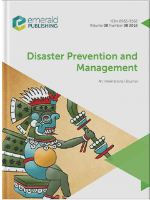
Disaster Prevention and Management
Scope & Guideline
Transforming theory into practice for disaster prevention.
Introduction
Aims and Scopes
- Interdisciplinary Research:
The journal emphasizes the importance of interdisciplinary approaches, integrating insights from various fields such as sociology, environmental science, urban planning, and public health to address complex disaster-related challenges. - Community Engagement:
A core focus is on participatory methodologies that involve affected communities in disaster research and management, highlighting the voices and experiences of marginalized groups, including Indigenous peoples and individuals with disabilities. - Policy and Governance:
The journal explores the dynamics of disaster governance, policy implementation, and the effectiveness of disaster risk management frameworks at local, national, and international levels. - Innovative Methodologies:
There is a strong emphasis on innovative research methodologies, including participatory action research, photovoice, and critical reflexivity, to enhance the understanding of disaster experiences and improve DRR efforts. - Social and Environmental Justice:
The journal addresses issues of social justice and equity in disaster risk reduction, focusing on how different social groups are affected by disasters and the need for inclusive practices in disaster management.
Trending and Emerging
- Indigenous Knowledge and Perspectives:
There is a growing trend towards incorporating Indigenous knowledge systems and perspectives in disaster risk reduction, recognizing their value in understanding local vulnerabilities and enhancing community resilience. - Intersectionality and Vulnerability:
Research is increasingly focusing on the intersectionality of social identities and how they influence vulnerability to disasters, particularly examining gender, race, and socio-economic factors in disaster contexts. - Participatory Action Research:
The use of participatory action research methodologies is on the rise, emphasizing collaborative engagement with affected communities to co-create knowledge and solutions for disaster risk reduction. - Climate Change and Environmental Disasters:
There is an emerging focus on the interplay between climate change and disaster risk, exploring how environmental degradation exacerbates vulnerabilities and impacts recovery efforts. - Ethics and Reflexivity in Disaster Research:
An increasing emphasis on ethical considerations and reflexivity in disaster research is evident, with scholars advocating for more responsible and inclusive research practices that consider the implications of their work on vulnerable populations.
Declining or Waning
- Traditional Disaster Response Models:
There is a noticeable decline in research centered on conventional disaster response models, as the field increasingly recognizes the necessity for adaptive, community-centered approaches that prioritize resilience and recovery. - Overemphasis on Technological Solutions:
Research focusing solely on technological solutions for disaster risk management has waned, with a growing recognition that human and social dimensions are crucial for effective disaster prevention and recovery. - Disaster Management as a Linear Process:
The perception of disaster management as a linear process is declining, as recent studies emphasize the complexity and interconnectedness of disaster phases, advocating for more dynamic and iterative approaches.
Similar Journals
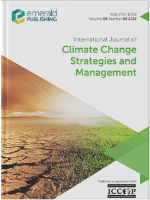
International Journal of Climate Change Strategies and Management
Connecting global minds for impactful climate action.Introducing the International Journal of Climate Change Strategies and Management, a premier publication dedicated to advancing the understanding and development of innovative strategies addressing climate change. Published by Emerald Group Publishing Ltd in the United Kingdom, this journal has established itself as a trusted source within the realms of development, geography, and environmental science. With an impressive 2023 impact factor reflecting its high citation rates and a Q1 classification in pivotal categories such as Development and Geography, the journal stands at the forefront of climate change discourse. Since adopting an Open Access model in 2018, it has broadened its reach, making cutting-edge research accessible to a global audience. The journal encompasses a wide array of topics essential for academics and practitioners alike, focusing on management, policy-making, and methods for effective monitoring of environmental strategies. By fostering interdisciplinary dialogue, the International Journal of Climate Change Strategies and Management is essential for those aiming to contribute to sustainable solutions in our rapidly changing world.

Risk Hazards & Crisis in Public Policy
Transforming challenges into solutions in public governance.Risk Hazards & Crisis in Public Policy is a leading academic journal published by WILEY, focusing on the interdisciplinary study of risks and crises as they pertain to public policy. Since its inception in 2010, this journal has established itself prominently in the field, currently holding a Q2 quartile ranking in Public Administration and boasting an impressive Scopus percentile of 89, ranking it 24 out of 232 journals in its category. This demonstrates its significant influence and relevance among peer-reviewed publications. The journal serves as a critical platform for researchers, policymakers, and practitioners to share innovative research, insightful analyses, and practical solutions related to the management and mitigation of risks in public administration. Although it does not currently offer open access options, it continues to provide vital insights into burgeoning issues within the domain, making it an essential resource for anyone interested in advancing their understanding of risk management in public policy contexts.
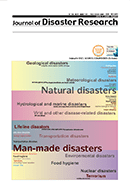
Journal of Disaster Research
Strengthening societal resilience through collaborative research.Journal of Disaster Research, published by FUJI TECHNOLOGY PRESS LTD, is a prominent Open Access journal that has been disseminating critical research on disaster management since its inception in 2007. Focusing on the interrelated fields of engineering and safety, the journal aims to advance knowledge and policy in disaster risk reduction, response, and resilience, making it an essential resource for researchers, practitioners, and policymakers alike. With an ISSN of 1881-2473 and E-ISSN 1883-8030, the journal covers a wide range of topics related to disaster studies, ensuring the dissemination of innovative solutions and diverse perspectives. Situated in Japan, the journal has been ranked Q3 in both Engineering (Miscellaneous) and Safety, Risk, Reliability, and Quality categories, showcasing its commitment to quality scholarship. As it converges its research contributions from 2006 to 2024, the Journal of Disaster Research continues to serve as a vital platform for advancing the science and practice of disaster research, thereby enhancing societal resilience against crises.

Journal of Safety Science and Resilience
Transforming challenges into opportunities in safety science.Welcome to the Journal of Safety Science and Resilience, a pioneering platform dedicated to advancing knowledge in the fields of safety, risk, reliability, and quality. Published by KEAI PUBLISHING LTD and based in China, this Open Access journal has made significant strides since its inception in 2020. With an impressive impact factor and a distinguished Q1 ranking in various categories, including Safety Research and Safety, Risk, Reliability and Quality, it serves as an authoritative resource for researchers, professionals, and students alike. The journal's commitment to disseminating high-quality research is reflected in its exceptional Scopus rankings, with top positions in decision sciences and social sciences. As we converge into the future with volumes planned up to 2024, engaging contributions focused on contemporary challenges and innovations in safety science are more essential than ever. Explore groundbreaking studies and elevate your understanding of resilience in the face of uncertainty through this invaluable academic resource.

Australian Journal of Emergency Management
Elevating standards in public health and safety.The Australian Journal of Emergency Management, published by the Australian Emergency Management Institute, is a pivotal resource in the field of emergency management, public health, and safety research. With a history dating back to 1998 and a convergence period extending to 2024, this journal actively contributes to advancing knowledge and practice in emergency medical services and related areas. Holding strong positions in both the Q2 and Q3 quartiles of 2023 rankings, it stands out within its categories, particularly in Health Professions and Safety Research. While it is not an open-access journal, it provides essential insights and empirical research that are invaluable for researchers, professionals, and students alike. Located in East Melbourne, Australia, the journal ensures that critical advancements in emergency management and health are highly accessible to its global audience, fulfilling its mission to promote informed decision-making and improve community resilience during crises.

Urbe-Revista Brasileira de Gestao Urbana
Advancing Urban Knowledge for a Sustainable FutureUrbe-Revista Brasileira de Gestão Urbana is a prominent academic journal dedicated to the field of urban management and development, published by the esteemed Pontificia Universidade Catolica do Paraná (PUCPR). This open-access journal, actively disseminating knowledge since 2009, focuses on advancing awareness and understanding of urban planning, architecture, and geographical issues in Brazil and beyond. With an impressive impact reflected in its 2023 quartile rankings—Q2 in Architecture, Q3 in Geography, Planning and Development, and Q3 in Urban Studies—Urbe serves as a vital platform for researchers and professionals alike. The journal strives to foster interdisciplinary dialogue and provide valuable insights into contemporary urban challenges, making it an essential resource for those engaged in the study and practice of urban management. Scholars can access it freely, enhancing its reach and relevance in an increasingly interconnected world.
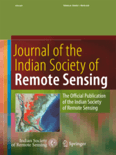
Journal of the Indian Society of Remote Sensing
Illuminating the Path of Remote Sensing ResearchJournal of the Indian Society of Remote Sensing, published by SPRINGER, stands as a prominent contribution to the fields of Earth and Planetary Sciences and Geography, Planning and Development. With an ISSN of 0255-660X and an E-ISSN of 0974-3006, this esteemed journal has been in circulation since 1973, showcasing a rich repository of research and advancements in remote sensing applications, methodologies, and technologies, specifically within the Indian context and beyond. The journal's impact is underscored by its placement in the Q2 category of both Earth and Planetary Sciences and Geography as of 2023, ranking impressively in the Scopus database with significant percentiles. With the intent to bridge the gap between theory and practical application, it invites scholars, researchers, and professionals to contribute innovative studies that enhance our understanding of remote sensing and its implications in various domains. The Journal of the Indian Society of Remote Sensing is a vital resource for anyone looking to remain at the forefront of research in this dynamic field.

Revista de Urbanismo
Shaping Cities Through Cutting-Edge ResearchRevista de Urbanismo is a distinguished open-access journal published by the Facultad de Arquitectura y Urbanismo, Universidad de Chile, dedicated to advancing knowledge and dialogue within the fields of urban studies, geography, planning, and nature conservation. Since its inception in 1999, the journal has embraced an open-access model, ensuring that cutting-edge research is freely available to scholars, practitioners, and students worldwide. With an esteemed reputation, the journal has achieved notable rankings in 2023, including Q2 in Geography, Planning and Development and Urban Studies, showcasing its commitment to high-quality scholarly contributions. The journal not only serves as a platform for innovative ideas and research findings but also aims to influence urban policy and sustainable development practices, addressing the pressing challenges faced by cities today. By fostering interdisciplinary collaboration, Revista de Urbanismo plays a pivotal role in shaping the future of urban environments in Chile and beyond.

Geoenvironmental Disasters
Exploring the intersection of environment and engineering.Geoenvironmental Disasters, published by SPRINGERNATURE, is a leading open-access journal dedicated to advancing the interdisciplinary fields of environmental science, geography, and geotechnical engineering. Since its inception in 2014, the journal has made significant strides in disseminating high-quality research that addresses the challenges posed by geoenvironmental hazards and their impacts on society. With an impressive Q1 ranking across multiple categories, including Environmental Science (miscellaneous) and Geography, Planning and Development, it occupies a vital niche within the academic community. The journal’s rigorous peer-review process ensures that only the most insightful contributions are made available to a global audience. Researchers, professionals, and students are encouraged to engage with the content, which covers a wide range of topics, including disaster management, risk assessment, and stakeholder engagement in policy-making. This commitment to open-access accessibility since 2014 further enhances its reach and impact, providing a critical platform for advancing knowledge and innovation in managing geoenvironmental disasters.
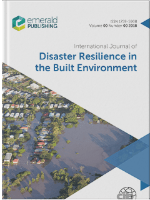
International Journal of Disaster Resilience in the Built Environment
Building a safer tomorrow, today.International Journal of Disaster Resilience in the Built Environment is a leading peer-reviewed journal published by Emerald Group Publishing Ltd, focusing on the crucial intersection of disaster resilience and the built environment. Established in 2010, this journal serves as an essential platform for researchers, professionals, and students engaged in the fields of Building and Construction, as well as Safety, Risk, Reliability and Quality, maintaining a respectable Q3 ranking in both categories as of 2023. With a commitment to enhancing global knowledge on resilient construction practices, the journal examines innovative strategies to mitigate risk and enhance safety in built structures. Despite its robust academic reputation, it currently operates without an open access model, emphasizing its curated approach to high-quality scholarship. The publication aims to foster interdisciplinary collaboration and advance the development of sustainable practices within the context of disaster risk reduction, making it a vital resource for anyone dedicated to improving resilience in the built environment.